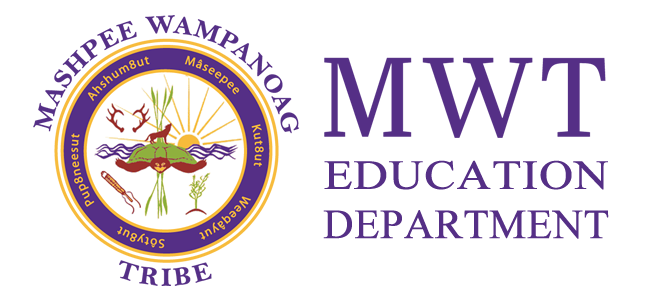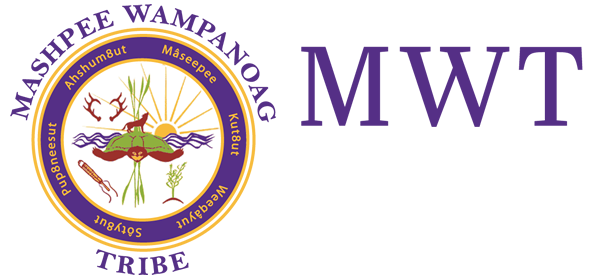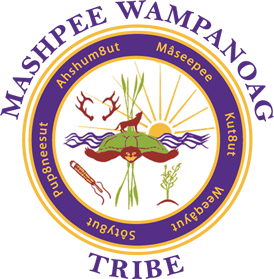Speakers Bureau
Culture Keepers, Native Historians, Subject Matter Experts
The Tribe’s Education Department has organized a Speakers Bureau, comprised of tribal culture-keepers and subject matter experts. Topics are as diverse as the individual members of the bureau and range from tribal historical perspectives, to colonization, sovereignty, government relations, tribal constitutions, and courts, to instructional strategies beneficial to the engagement of tribal students.
Browse the speakers and topics. Fees for formal speaking engagements vary and are set at the speaker’s discretion.
Dr. Casey Thornbrugh - Climate Change Program
Dr. Casey Thornbrugh currently serves as the Program Manager for the Climate Change Program with United South and Eastern Tribes Inc (USET). Casey also serves as the Tribal Climate Science Liaison between the Northeast and Southeast Climate Adaptation Science Centers (NE/SE CASCs) to provide current climate science information and to provide climate adaptation planning support to Tribal Nations. Casey served as a science and geography instructor at Tohono O’odham Community College, a Tribal College serving the Tohono O’odham Nation in southern Arizona. He also served as the Director of Natural Resources for the Mashpee Wampanoag Tribe. Casey has an educational background in geography, climate science, and American Indian studies from the University of New Mexico and the University of Arizona.
SPEAKING TOPICS
Climate Change & Climate Resilience in Tribal Communities
Going to college away from home
Considering going to a Tribal college (He taught and worked at a Tribal college from 2007-2015)
Studying climate or environmental science in college
Finding the best internship opportunity for you
Thinking about geography from Tribal perspectives
Careers serving Tribal nations and communities
Navigating life as a multicultural person (Wampanoag, Black, and White)
Rita Lopez - Historic Preservation
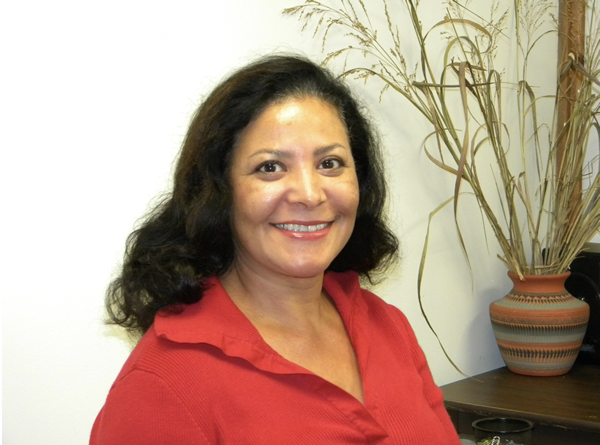
Rita is the daughter of Carol and Vincent ‘Cuddy’ Lopez the middle child of 7. Born and raised in Mashpee next to the river, moved to Connecticut at age 21, then to Boston at age 25 back home in 1995. Worked in the IT department for the Gillette Company in Boston for 2 years, then became an IT support specialist moving into management and opening and training 4 global computer support call centers around the world. Stayed with Gillette for a total of 22 years.
Attended college part-time while working full-time, and came home frequently. Eventually, she built her own home next to the house she grew up in with her dad living with her and 7 other family homes as neighbors on Meetinghouse Road.
Working with the Historic Preservation department she has gained a great deal of historical and cultural knowledge about the tribe even as an adult over 50, while contributing information for the many milestones of the tribe. Re-documented the Old Meeting House Cemetery Plots as well as all other Mashpee Cemeteries. Documents tribal members who are or were veterans. The enrollment Director is much like a Town Clerk who documents the citizens who are part of the tribe.
You won’t see her in photos she’s camera shy, but you could find her if you are out walking the paths and woods and shores of Mashpee.
Contact: [email protected]
Darius Coombs - Cultural Outreach Coordinator

Darius Coombs is a proud father of 4 girls and has been married to his loving wife Toodie for close to 20 years. He is also a Mashpee Wampanoag tribal citizen and is the Cultural Outreach Coordinator for the Mashpee Wampanoag Education Department. Darius is the former Director of the Wampanoag Indigenous Program at Plimoth/ Patuxet Museums for over 30 years. Over his career Darius has worked with Smithsonian, History Channel, National Geographic, and Scholastic to name a few.His teaching of Wampanoag and other Indigenous cultures in the history of the northeast is recognized throughout the country. He has presented at conferences, colleges, historical societies, museums, indigenous institutes, and all grades and levels of learning in North America. Darius is also the recipient of the 2016 NEMA ( New England Museum Association) Award for Excellence and the 2021 Bay State Legacy ward.
Contact: [email protected]
Jessie Little Doe Baird - Language Reclamation
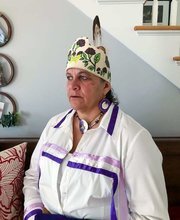
Jessie Little Doe Baird is a citizen and former Vice Chairwoman of the Mashpee Wampanoag Tribe and Linguistic Director for the Wôpanâak Language Reclamation Project. She was born in Mashpee and lives in Cotuit and Aquinnah. jessie is married and has five children and 9 grandchildren.
She is the Co-founder and Director of the Wôpanâak Language Reclamation Project that began in 1993. This is a Cooperative endeavor between Mashpee, Aquinnah, Herring Pond and Assonet communities. The aim of the project is to reclaim Wôpanâôt8âôk as a spoken language. There were no speakers of the language for six generations.
She received her Master of Science in Linguistics from MIT in 2000. In addition, she holds Degrees Honoris Causa from Cape Cod Community College and Yale University. She has completed a layperson’s introduction to Wampanoag grammar as well as curriculum for teaching and is currently working toward the completion of a dictionary and expansion of the curriculum for Master Apprentice teaching and is working on the Mohegan Pequot language as well where she currently has two apprentices.
Jessie’s many books in the language including grammar textbooks, coloring books, stories, game curriculum, a prayer book, and a phrasebook for everyday use are being used as one tool in reclaiming fluency. She writes articles on Wampanoag culture and history and is a former research fellow of the National Science Foundation’s Documenting Endangered Languages as well as a member of the American Antiquarian Society, a Paul Harris Fellow, a Mac Arthur (Genius) Fellow, and is named one of One Hundred Women of the Century by USA Today.
She has served on numerous advisory boards in the areas of Indigenous culture and history. Jessie has participated in Mashpee town government on the Mashpee Housing Authority as a commissioner as well as the Mashpee Historic District and in an advisory capacity for past Wampanoag cultural projects and films for various organizations. She also gives talks for colleges and universities in the US and abroad. Her other interests include traditional dance, cooking for family and friends, shell fishing, creation of regalia, a passion for Wampanoag written histories and documents as well as writing.
David Weeden - Historic Preservation
Mr. David Weenaatainnini (One Who Walks Alone) Weeden’s recent work began with the Mashpee Wampanoag Tribe in 2015 as the Deputy THPO for the Tribal Historic Preservation Office. In December of 2019 Mr. Weeden assumed the responsibilities of Tribal Historic Preservation Officer/Director; a job which he is extremely passionate about. Past professional accomplishments are working as a cultural educator, interpreter with the Wampanoag Indian Program at the Plymouth Plantation, union laborer, union laborer foreman, and draftsman/detailer; before taking his recent positions.
Educational background includes certificates in Geographic Information System (G.I.S.), Bryant University Project Management Book of Knowledge (PMBOK) certified. Mr. Weeden also attended Cape Cod Community College studying liberal arts technology and acquired an A.S., Architectural Building and Engineering Technology degree from the New England Institute of Technology.
Raised in a very traditional and culturally oriented family and grounded in Wampanoag cultural beliefs and practices that influence and guide daily responsibilities. Guiding principles are to confront all systemic oppressions facing Tribes, for the benefit of those yet to come.
As an actively involved Tribal member Mr. Weeden’s civic services include sitting on the Town of Mashpee – Board as Selectman (elected 9/2019-present), Mashpee – Planning Board Member (4/2016 – 5/2019), Native American Representative on the Cape Cod Commission as an appointee to the County regulatory authority (4/2016 -present) and also serves as Tribal Councilman (2/2016-present).
Mr. Weeden draws from all his accumulative experiences in his current roles today and enjoys the opportunity to work in the preservation field.
Contact: [email protected]
Hartman Deetz - Wampanoag History
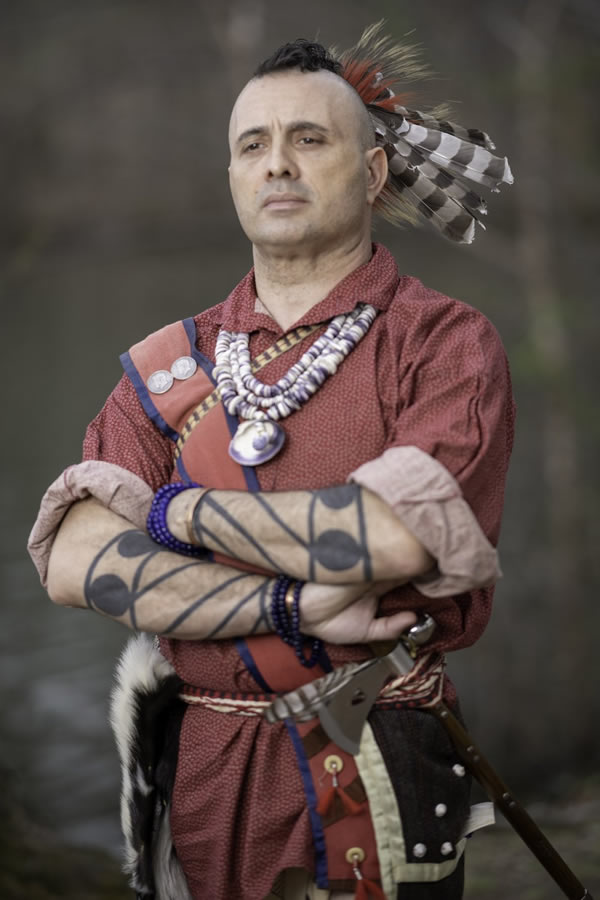
12,000 Years of Wampanoag History – the overarching story
Wampanoag Colonial-era history: Squanto, King Phillips War / Trade and Governance / Annual Subsistence Cycle / Indian Slave Trade.
US Indian Wars era: Wampanoag Diaspora. Role of the Church in Native New England / Manifest Destiny & Indian Removal- land disposession & political disenfranchisement, / Native Religious persecution.
Late 19th through 21th century: Indian Allotment and Reorganization / Mexico to Canada – missions and boarding schools / Red Power – Alcatraz AIM Wounded Knee Oka / Water Wars – Standing Rock to Westuweten / Economic Rights – sovereignty, casinos and self-determination / Idle No More and the modern environmental movement.
Conceptual – Art and Activism / Tribal Jurisdictional Authority and Environmental Stewardship / Developing a Tribal Pedagogy / Mutual Aid, tribe to tribe & native nations to settler populations / New Economies, thinking outside the capitalism and communism dichotomy / Energy Independence / Food Justice.
Hartman Deetz is an artist/ educator who is an enrolled member of the Mashpee Wampanoag tribe. Deetz has been involved in activism advocating for native rights and environmental preservation for the majority of his life, traveling nationally and abroad to learn from and advocate for issues affecting native people.
Contact: [email protected]
Robert Peters - Contemporary Indigenous Art & Community Connections
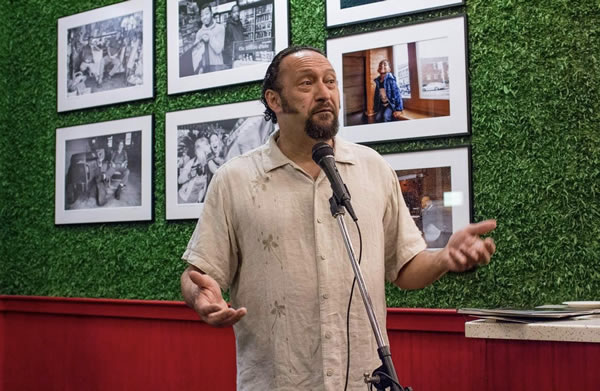
Robert Peters is a Mashpee Wampanoag Artist, Poet, and Author. He published his first book “Da Goodie Monsta” in the fall of 2009 and is currently working on a series of acrylic paintings called 13 Moons.
“Da Goodie Monsta” is an illustrated children’s book based on a dream his son Robert Jr. had when he was three years old. The story depicts a monster that is part lion, part bird and part dragon wearing roller skates. “Da Goodie Monsta” chases away nightmares. The story introduces the reader to a boy named Shaka who has no dreams at all. Read this beloved tale to learn how Shaka finds his dreams.
“13 Moons” is intended for a calendar for the year 2015. Seven of the Thirteen acrylic panels are available as signed prints: Moon Rise:, Illumination, Grace, Rage Against The Machine, Circle of seven and The Honor Beat.
“Year Of The Red Forest” is a work in progress depicting Mashpee in 1976. Robert began writing and designing illustrations in 2011. To date he has completed three paintings in this series; – “Father, Teacher, Sachem” – “Vision From Doug – Fighting Fire.
Robert’s family moved to the Wampanoag home land of Mashpee when he was ten. Here his father Russell entered a life-long battle to regain land and sovereignty for the Mashpee Wampanoag People. As a child, Robert witnessed the 1976 Wampanoag Indian land claim, trial and the tribe’s quest for Federal Recognition.
Robert retired from the Massachusetts Bay Transportation Authority after 24 years of service. During this period he observed the culture of Boston’s subway system working as a motorman, union steward and at times a civil rights activist on the MBTA’s Orange Line. He drew pictures, took notes and made commentary.
Today Robert continues writing, painting, and working with youth. He is a fire keeper and a keeper of oral tradition.
Contact: [email protected]
gkisedtanamoogk Wampanoag Ceremony, Longhouse Governance, Socio-Familial Life & Wampanoag History
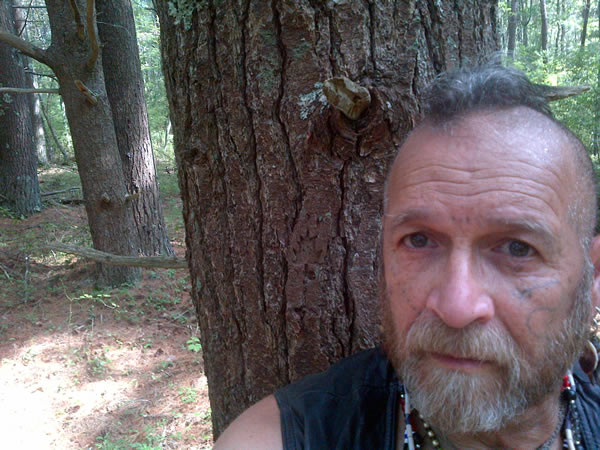
General Overview of Indian Country
What i taught for 10 years at the University of Maine, Orono Campus—Introduction to Native Studies; general and conceptual framework of Indigenous Life with Wampanoag specifics—for examples
Wampanoag Ceremony and the Science of Ceremony
This is my Life’s “work”; what i have learned over the past 50+ years working with Ceremony; the science of ceremony is the explanation of what is going on beyond what we see
The Reflective Oneness of Creation and the Cosmos
This is what ceremony has enlighten me over the years; the interconnection of the cosmos and the molecular
Introduction to Indigenous Law
This is not federal/state/provincial law applied to Indian Country; this is strictly about Indigenous Law
Wampanoag Theory on Longhouse Governance
The political framework and workings of Wampanoag Traditional Governance; the potential ramifications for present and future governance and governance structure; what we can learn from the times before now
Wampanoag Theory of Socio-Familial Life
How Wampanoag Clan/Extended Family provides stability, security, and creativity in realizing our full potential as Wampanoag People into the future
Wampanoag Framework of History Before and Since 1492
Providing a Wampanoag Narrative of what existed before 1620, what was brought here from europe, how this informs our present strata of living, and how we could/will overcome north america
Contact: [email protected]
Marjory Gomez O’Toole - Indigenous Slavery & The History of the Sakonnet People
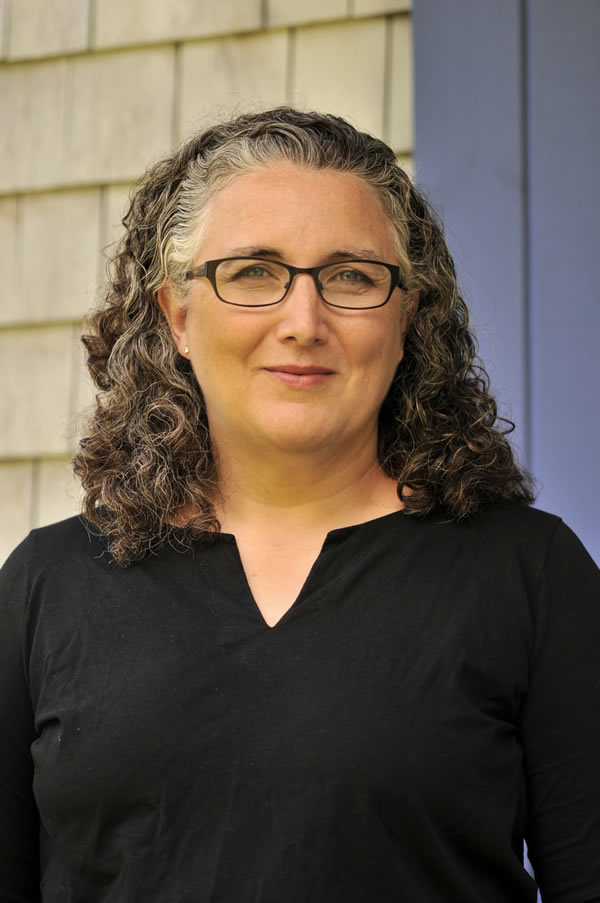
Indigenous Slavery, Indenture, and Freedom Along the Southcoast
Marjory will share her primary source research documenting both the “term” and the “life-long” slavery of Indigenous people in and around Sakonnet/Little Compton, Rhode Island during and after King Phillip’s War. She will explore how Benjamin Church used the threat of slavery to secure an alliance with the Sakonnet people as well as evidence that links him to the mysterious sale of people from Sakonnet in 1704. Discussions of the personal histories of men like Joab the Sakonnet, Peter Awashonks, Amos, and Isaac, and women like Experience Tobe and Fal Solomon will reveal aspects of local Indigenous slavery and indenture well into the 18th century.
The History of the Sakonnet People – An Ongoing Study
For over a decade the Little Compton Historical Society has been reviewing secondary sources and seeking out new primary sources, including Wôpanâak words, to better understand and share the history of the Sakonnet people. This is an ongoing project and work is intensifying in anticipation of the 400th anniversary in 2025 of the bloody conflict, commonly known as King Philip’s War, that divided the Sakonnet people and changed their history forever. Marjory will share what we currently understand about the history of the Sakonnets and their sachems Awashonks and Mammanuah before during and after the war. She will also discuss the histories of Indigenous people who lived in Little Compton throughout the 20th century as well as current efforts to make meaningful connections with Sakonnet descendants.
Contact: [email protected]
Jason Mancini - Maritime Labor & Census Making
TALK ABSTRACTS FOR JASON MANCINI
“preserved on the mighty waters”: Indians, Maritime Labor, and Communities of Color in Southern New England
Over nine million acres of Indian Country in southern New England and Long Island were reduced to less than 30,000 acres by the American Revolution. Indians across the region adjusted in different ways to this rapidly changing world. One important and largely unseen shift involved the participation of Indian men in various forms of maritime labor – from shipbuilding to whaling. This talk focuses on the hundreds of Indians – and other men of color – that found work in the customs districts and explores their “roots” and “routes,” the global social networks they formed, and their traveling histories from the objects they collected and stories they told.
“in contempt and oblivion” – Ezra Stiles, Census Making, and Indian Erasure in New England
By the end of the American Revolution, southern New England’s Indian population had essentially been declared extinct through popular literature and prevailing opinion. At the same time, there were nearly 4,500 Indians documented in census records in southern New England, 50 percent of whom lived in non-reservation English towns. Mancini has used ethnogeography as an analytic tool for exposing colonial epistemologies and discourse about Indian “disappearance” and elucidating hidden Indian histories in southern New England. His work uses census records to illustrate major population trends as tribal land dispossession and changing notions of tribal citizenship reshaped Indian communities on and off the reservations during the colonial period.
DR. JASON MANCINI BIO
Dr. Jason Mancini joined Connecticut Humanities as Executive Director in 2018 and will be a Mellon Fellow in Slavery and Justice at Brown University in 2022. He is also a co-founder of Akomawt Educational Initiative and former Executive Director of the Mashantucket Pequot Museum and Research Center. During the past 30 years, he has worked with and on behalf of the tribes and Indigenous peoples of southern New England, Alaska, Hawai’i, and New Zealand. He is an ally to these communities and works to build awareness of Indigenous rights, homelands, and histories within non-Indigenous contexts. His academic interests include Native responses to dispossession, enslavement, and indenture and well as Indigenous social networks, ethnogeography, maritime labor, and migration. Jason has served as Adjunct Professor of Anthropology at the University of Connecticut, Visiting Assistant Professor of Anthropology at Connecticut College, Visiting Assistant Professor of History at Brown University, and Social Sciences Instructor at Sea for Sea Education Association (SEA). Jason holds a Ph.D. in anthropology from the University of Connecticut with expertise in the archaeology and ethnohistory of New England. His article, “in contempt and oblivion”: Censuses, Ethnogeography, and Hidden Indian Histories in Eighteenth-Century Southern New England, published in the Journal of Ethnohistory and his forthcoming book projects, “Beyond Reservation: Indian Survivance in Southern New England,” and “The Narragansett Chief: Adventurers of a Wanderer” (an edited volume) examine the nuanced and subverted histories of the Indigenous peoples of the American northeast.
Contact: [email protected]
Michelle L. Cook - Indigenous Human Rights, Business and Indigenous Human Rights, Federal Indian Law, Women's Studies, Navajo Tribal Courts
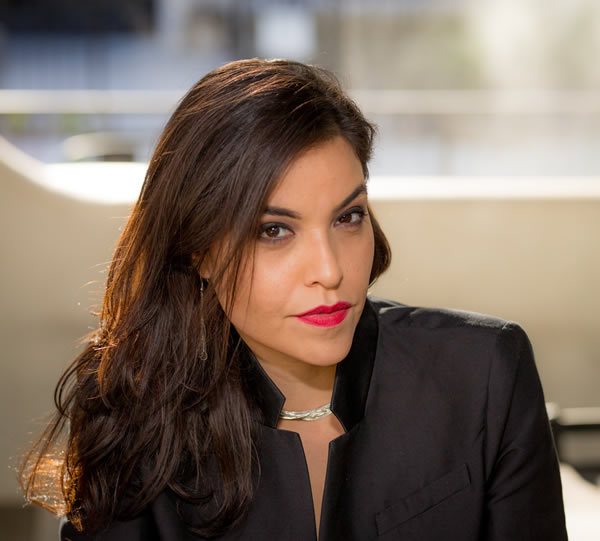
TALK ABSTRACT FOR MICHELLE L. COOK
Michelle L. Cook is a human rights lawyer and an enrolled member of the Diné (Navajo) Nation born of the Honagháahnii (One Who Walks Around You) Clan. For several years, Michelle has worked locally and globally with indigenous peoples on issues such as access to justice, customary law, and human rights. She has received major grants and fellowship opportunities including a Fulbright Fellowship to study indigenous justice and customary legal systems in Aotearoa (New Zealand) and an Open Society Fellowship. She has testified before UN bodies and representatives and the Inter-American Commission on Human Rights and has been interviewed by international media sources like the Laura Flanders Show. Her work and projects have been featured in Responsible Investor, TIME, Reuters, GLAMOUR, The Guardian, and Cultural Survival International. She has provided commentary for the BBC and has been featured on panels alongside writers like Chris Hedges and humanitarians like performing artist Sting, actor Danny Glover, and Roger Waters founder of Pink Floyd. In 2015 she received her Juris Doctorate (J.D.) from the University of New Mexico School of Law with a certificate in Federal Indian law. She was appointed as a Commissioner on the Navajo Nation Human Rights Commission from 2016-2020. She is a founding member of the Water Protector Legal Collective creating legal infrastructure for indigenous peoples encamped in opposition to the Dakota Access Pipeline. She is also the founder of Divest Invest Protect (DIP) and Co-Director of DIP’s flagship program, the Indigenous Women’s Divestment Delegations (IWDD) an intersectional indigenous-led international human rights campaign pressuring banks, insurance, and credit rating agencies to divest from harmful extraction companies and invest in the cultural survival and self-determination of the world’s indigenous peoples. Currently she is a Doctor of Juridical Science (SJD) Candidate at the University of Arizona’s Indigenous Peoples Law and Policy Program and her dissertation concerns the intersections of indigenous human rights, divestment, and gender in the United States. She is now developing the Indigenous Human Rights Defenders and Corporate Accountability Program (IHRDCAP) at the University of Arizona School of Law.
Michelle L. Cook is a human rights lawyer and an enrolled member of the Diné (Navajo) Nation. She is also the founder of Divest Invest Protect (DIP) and Co-Director of the Indigenous Women’s Divestment Delegations (IWDD) an indigenous-led international human rights campaign pressuring banks, insurance, and credit rating agencies to divest from harmful extraction companies and invest in the cultural survival and self-determination of the world’s indigenous peoples. She is currently developing the Indigenous Human Rights Defenders and Corporate Accountability Program (IHRDCAP) at the University of Arizona School of Law.
Contact: [email protected]
Douglas George "Kanentiio - Contemporary Native American Issues
Kanentiio, is Akwesasne Mohawk territory and is a lecturer, renowned author and award winning journalist. He is nationally recognized as a primary source of information about Iroquois politics and culture. His expertise has been relied upon and sought after by historians, film producers as well as television documentary directors. He is a columnist for News From Indian Country and Indian Time publications.
Kanentiio is currently the vice president of the Hiawatha Institute for Indigenous Knowledge at Syracuse University, a centre for the preservation and promotion of the ancestral teachings of the Native peoples of the northeast. The HI is the fifth such institution in the world.
Kanentiio was selected to be a delegate to the World Parliament of Religions in Capetown, South Africa in 1999, in 2004 in Barcelona, Spain and again in 2008 in Melbourne, Australia. His experiences in Capetown are part of the “A Seat at the Table” film by Garh Rhine and and book by Phil Cousineau.
Kanentiio coordinated the Traditional Knowledge conferences for the American Indian Science and Engineering Society (AISES) and was a presenter at its Native Astronomy -Star session at the University of Colorado and organized the “Traditional Knowledge: Plants” conference in Albuquerque, New Mexico. He also served as moderator for the AISES conference on “Origins and Migrations” held in Boulder, Colorado in November, 1995.
Kanentiio has spoken on contemporary Native American issues in such countries as Spain, Africa, Instanbul, Italy, Germany, Austria, Switzerland and Luxembourg. Kanentiio has given lectures and key note speeches at many universities and conferences throughout the United states. He was the featured lecturer at the annual Partners in America “Fellowship and International Development” gathering held at Tuskegee, Alabama as well as delivering the key lecture at the 2005 “Northeastern Indians and the American Revolution Conference at the Pequot Museum in Mashantucket, CT.
Contact: [email protected]
Alice Nash - Teaching Native History
Alice Nash is a historian with an interest in how Native American history is taught in schools. Together with Linda Coombs (Aquinnah Wampanoag), she co-directed Teaching Native American Histories, a Summer Institute for K-12 teachers funded by the National Endowment for the Humanities (2017, 2019). She received two prior NEH grants (2013, 2015) for a Summer Institute on Native Americans of New England. Her research interests range from the impact of colonization on family and gender relations in Wabanaki history before 1800 to current matters such as the U.N. Permanent Forum on Indigenous Issues. Her most recent publication is an essay on “Indigenous Peoples of the Americas to 1900,” published in The Routledge Handbook to the History and Society of the Americas (Routledge 2019) which she co-edited with Olaf Kaltmeier, Josef Raab, Michael Stewart Foley, Stefan Rinke and Mario Rufer.
Conntact: [email protected]
Jean M. O’Brien - Indigenous Land Relations
Jean M. O’Brien (citizen, White Earth Ojibwe Nation) is Distinguished McKnight University Professor and Northrop Professor of History at the University of Minnesota. She is a co-founder and past president of the Native American and Indigenous Studies Association and inaugural co-editor (with Robert Warrior) of the association’s journal, Native American and Indigenous Studies. She has published seven books, mostly recently, Allotment Stories: Indigenous Land Relations Under Settler Siege (edited with Daniel Heath Justice, University of Minnesota Press, 2022). Her most recent monograph (with Lisa Blee) Monumental Mobility: The Memory Work of Massasoit, won the inaugural Winthrop Prize for the Outstanding Book on Seventeenth-Century New England for 2019-2020 from the Colonial Society of Massachusetts, an honorable mention from the National Council on Public History, and was a finalist for the Best Subsequent Book from the Native American and Indigenous Studies Association. O’Brien is an elected member of the Society of American Historians.
Contact: [email protected]
Christine M. DeLucia - King Phillips War
I am a historian at Williams College, located in ancestral and unceded homelands of the Stockbridge-Munsee Mohican Community. I use my scholarship and teaching to build stronger understandings of Indigenous peoples–past, present, future–and the complex relationships communities have developed with place, heritage, and colonization. I explore the stories diverse communities tell about history, and how accountings of the past can assist us in creating more just and sustainable futures for humans and the earth. I live and work in the Native Northeast/New England. I am committed to highlighting new approaches to this region as well as its far-reaching connections to North American and global communities.
My book Memory Lands was published by Yale University Press in the Henry Roe Cloud Series on American Indians and Modernity (Jan. 2018). It has been awarded the Berkshire Conference of Women Historians book award, the Peter J. Gomes Memorial book prize from the Massachusetts Historical Society, the Lois P. Rudnick book prize from the New England American Studies Association, and Honorable Mention for the National Council on Public History book award.
Contact: [email protected]
Speaker Booking Request
For further assistance, please complete the form below and a member of the Educaiton Department will be in contact with you.
"*" indicates required fields
Mashpee Wampanoag Tribe
Education Department
483 Great Neck Road South
Mashpee, MA 02649
508-477-0208 x8
Quick Menu
Stay Connected
Follow Us
